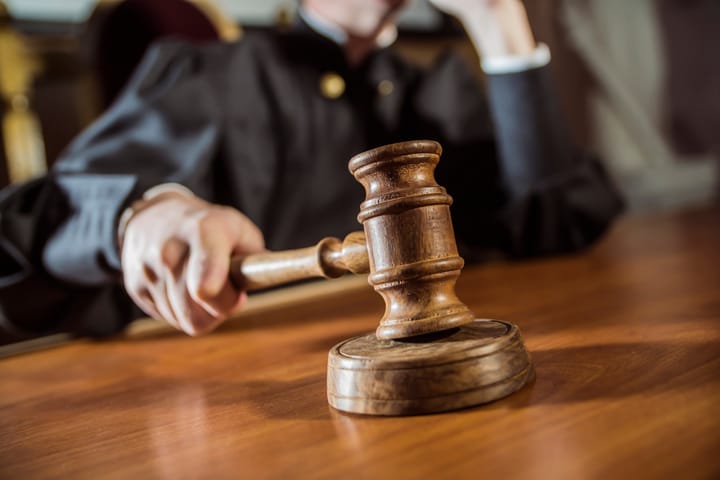How small habits transform your firm
Plus: Cyber-security must-dos | Meet the special master

We’ve all heard that our habits shape our character, but do they also shape our law firms? This week, we explore small habits and mindset shifts to transform your practice.
Plus, peek into a special master’s role and hear a podcast by a juror sequestered in a high-profile murder trial.

It’s art. Courtroom artist capturing the Diddy trial discusses her craft. Jimmy Kimmel lampoons her work, says he would rather be sculpted.
Hello, summer associate season! Here’s a classic TED Talk on mentoring to prepare you for their arrival. And here’s the transcript if you prefer to read instead of listen.
Kim K., Esq. Kim Kardashian is now eligible to take the bar after six years of California’s (traditionally four-year) Law Office Study Program. Plus some speculation about her courtroom demeanor based on her recent court testimony and upcoming legal drama on Hulu.
Civics 101. Harvard is promoting its free, online civics course in response to Trump admin pressure.
Planning a vacation? Chief Justice John Marshall’s robe is on display in Virginia. His kidney stones are in Philly.

Demystifying special masters
In cases where resolution seems impossible, judges are increasingly asking special masters to step in and find a path forward. Raise the Bar sat down with Albuquerque-based attorney Bob Matteucci to get the inside scoop on this somewhat mysterious job. –Emily Kelchen
How would you explain the role of a special master to someone unfamiliar with it? I personally hadn't heard of it before the Trump documents case.
I am in no way happy that Trump brought the term “special master” to the press. I don’t think that case was a good example of what special masters actually do. A better example, and one that most attorneys are familiar with, is when a family court judge appoints a guardian ad litem in a custody case. A GAL is a type of special master, or at least they are in New Mexico.
That I have heard of. So, a special master is just another neutral party?
Yes and no. In some cases, the special master is there to bring in information to the court that nobody else can bring in. The information the court needs may be something the court doesn’t have expertise about or the court believes that the information being brought in is biased.
But in other cases, a judge may bring a special master in because there are specific tasks that need to be done. An example could be a divorce where the parties need to sell the house, but the parties won’t agree on the realtor, listing price, showing dates, etc. Or where an inventory or assessment is needed and the parties can’t agree who to hire to do that work.
I’ve also been appointed in a case where a divorcing couple owned a few businesses together and they were fighting about payroll, hiding money, etc. The attorneys wanted me to monitor the business to make sure nothing bad happened.
The attorneys brought you in?
They petitioned the court to hire me. When you are appointed as a special master you have the parties sign an appointment order that spells out your duties. Or you have the judge sign off on one. The appointment order spells out exactly what your duties are.
If my job is selling a piece of real estate, the appointment order signed by the judge says that I can act as the owner of the property. In other cases, I may be appointed to make recommendations, and judge will decide how to move forward.
Do you see the use of special masters growing, especially in complex cases or overloaded courts?
I think so, but only when it is going to save time and costs. Special master’s fees add up quickly. I charge at my attorney rate. If I am counting forks in a divorcing couple’s kitchen, I am not a benefit to anyone but myself. But if I am helping a stuck case move forward or a family business survive a divorce, there’s room for another pig at the trough.

Protect your firm from cybercrime
Law firms are prime targets for cybercriminals who use business email compromise (BEC) tactics—like phishing and impersonation—to trick you into wiring funds to fraudulent accounts. Falling victim to one of these attacks can lead to legal malpractice claims and disciplinary action. Complicating matters, many cyber insurance policies do not cover client-held funds (such as IOLTA accounts), exclude losses from voluntary transfers, or deny claims due to procedural missteps like late reporting. Worse still, when firms try to recover losses through litigation, insurers frequently win.
Why this matters: Law firms must make cybersecurity a core part of their operations. (The Florida Bar just put out some new guidance on this if you don’t know where to start.) Failing to protect against cyber attacks puts much more than your client’s money at risk. (Integreon)

All rise… from your desk chairs
For many of us, long hours at a desk are a given. Whether drafting briefs, meeting with clients or navigating the daily flood of email, our work is largely sedentary. But as the science on the health risks of prolonged sitting becomes clearer (hello, cardiovascular disease, diabetes and chronic back pain), standing desks are becoming more popular. The New York Times’ Wirecutter and Business Insider have each put out an updated roundup of the top standing desks on the market. And Wirecutter also has an older article on how to adjust to using a standing desk that is a must-read if you are making the switch.
Why this matters: In a profession where our minds do most of the heavy lifting, it’s still important to take care of our bodies. Standing for part of the day can improve posture, reduce fatigue, and even boost focus—something most of us could use! (Cleveland Clinic)

Inside the mind of a juror
Shortly after the verdict was issued in the high-profile murder case Tennessee v. Jason Chen, Juror #11, or Sara Reid as she is known to most people, released a 12-episode podcast dissecting the case and her experience serving on the sequestered jury. Most of the episodes cover the day-by-day happenings in the case (making you wonder if she spent her evenings in sequestration outlining her script), but the last few go more into her observations and opinions.
Why this matters: This is more than your typical true crime podcast. Reid’s candid commentary gives you insight into how jurors perceive evidence, testimony and the attorneys involved. (Sequestered)

- Can AI help judges interpret a text’s ordinary meaning?
- FBI launches new probe into Dobbs leak
- Delaware looks at bar exam alternatives
- Is this the end of Humphrey’s Executor?
- Provision slipped into the 'One Big Beautiful Bill' would allow the executive branch to avoid following court orders

Everyone at your firm needs to have a marketing mindset
If you want to raise the profile of your practice, marketing cannot be treated as an afterthought or left to a single person. Real growth comes when marketing is part of the firm's everyday culture. This article outlines a few steps you can take to make this happen. Simple things like putting marketing on the agenda during every team meeting, celebrating when someone at the firm gets a positive review and giving staff ideas for social media posts.
Why this matters: Encouraging every employee to think about how they can contribute to the firm’s marketing can create more consistent messaging, better client experiences and sustainable growth. In short, marketing works best when everyone knows why it is important and is expected to help out. (Legal Marketing Blog)
Thank you for reading Raise The Bar.
Every Thursday, you'll hear from our team about the most pressing issues facing legal practices today. We'll also try to include some quick-hit reads that touch on interesting cases and precedents being set worldwide.
Have anything you'd like us to cover? Send an email raisethebar@mynewsletter.co
Raise the Bar is curated and written by Emily Kelchen and edited by Bianca Prieto.




Comments ()